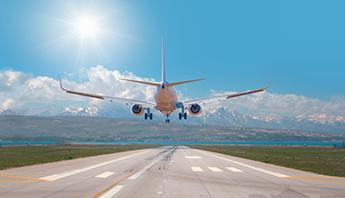Briefing for European aviation stakeholders
ITF’s recent work on aviation was the focus of an ITF presentation during the triennial plenary meeting or the European Civil Aviation Conference (ECAC) in Strasbourg, France, on 11 July 2018. ECAC brings together 44 countries in promoting a safe, efficient and sustainable European air transport system. Its triennial plenary meeting agrees the organisation’s work programme and budget. It also adopts recommendations, resolutions and guidelines. The ITF is an observer with ECAC.
Mary Crass, ITF’s Head of Institutional Relations and Summit, highlighted aviation-related outcomes of the ITF’s Annual Summit on “Transport Safety and Security” in May 2018 in Leipzig, Germany. The Summit had been attended by many high-level aviation representatives including Ms. Fang Liu, Secretary-General of the International Civil Aviation Organization (ICAO), Alexandre de Juniac, President and CEO of the International Air Transport Association (IATA), Eamon Brennan, Director-General of Eurocontrol, and Angela Gittens, Director-General of Airports Council International.
Ms Crass noted the findings of the Summit session on “Protecting the Sky with Secure and Efficient Air Travel” which emphasized the importance of effective co-operation between stakeholders, the need to embrace new technologies and making the necessary investments, as well as the critical role of a flexible and outcome-focused approach to regulation. Other aviation related events at the Summit included sessions on the potential of drones and a visit to DHL’s airfreight hub at Leipzig-Halle Airport. Session summaries are available online.
An ITF workshop held in Seoul, Korea, in December 2017 examined how air connectivity can be defined, measured and improved. The discussions included Incheon and Schiphol airports, PTV Group, MAVCOM, and UBC and found that simple connectivity metrics are often misleading. A combination of network quality modelling and micro-simulation modelling of passenger flows could be more useful to policy makers in improving air connectivity. Another conclusion was that knock-on impacts of one connectivity dimension on all other aspects of connectivity should be considered before policy decisions are made. Finally, there is a trade-off between air connectivity and resilience; governments need to consider distributional impacts of any connectivity changes. The report with the results of the workshop is available online.
Among the upcoming aviation-related work, ITF is working with the United Kingdom on a project to examine government support measures for domestic air connectivity. Against the background of the UK’s decision to expand Heathrow Airport and safeguard a proportion of slots at the new runway for domestic connections, experts will assess government support measures to domestic air connectivity in Australia, Canada, Japan, Norway, and Sweden and the USA at a workshop on 10/11 September 2018. The policy recommendations will feed into the 2019 UK Aviation Strategy.
In April 2019, the ITF will hold a Roundtable on “Connectivity of Small Populations in Remote Communities”. Initiated by Canada with support from Japan and the UK, this meeting will look at connecting small remote communities to transport systems by air and examine economic, social and health considerations for long-term viability of such services.
Both projects will also feed into the ITF’s 2019 Summit on “Transport Connectivity and Regional Development”, to be held from 22-24 May 2018, where aviation will be a central theme. For more information about the 2019 Summit, subscribe to ITF Summit Updates here.
